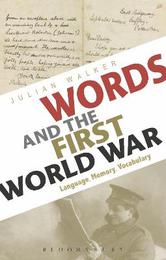
|
Words and the First World War: Language, Memory, Vocabulary
Hardback
Main Details
| Title |
Words and the First World War: Language, Memory, Vocabulary
|
| Authors and Contributors |
By (author) Julian Walker
|
| Physical Properties |
| Format:Hardback | | Pages:418 | | Dimensions(mm): Height 216,Width 138 |
|
| Category/Genre | Sociolinguistics
Historical and comparative linguistics
First world war |
|---|
| ISBN/Barcode |
9781350001930
|
| Classifications | Dewey:940.3014 |
|---|
| Audience | | Tertiary Education (US: College) | | Professional & Vocational | |
|---|
| Illustrations |
50 bw images
|
|
Publishing Details |
| Publisher |
Bloomsbury Publishing PLC
|
| Imprint |
Bloomsbury Academic
|
| Publication Date |
28 December 2017 |
| Publication Country |
United Kingdom
|
Description
"An illustrated analytical study, Words and the First World War considers the situation at home, at war, and under categories such as race, gender and class to give a many-sided picture of language used during the conflict." The Spectator First World War expert Julian Walker looks at how the conflict shaped English and its relationship with other languages. He considers language in relation to mediation and authenticity, as well as the limitations and potential of different kinds of verbal communication. Walker also examines: - How language changed, and why changed language was used in communications - Language used at the Front and how the 'language of the war' was commercially exploited on the Home Front - The relationship between language, soldiers and class - The idea of the 'indescribability' of the war and the linguistic codes used to convey the experience 'Languages of the front' became linguistic souvenirs of the war, abandoned by soldiers but taken up by academics, memoir writers and commentators, leaving an indelible mark on the words we use even today.
Author Biography
Julian Walker is a writer, researcher, artist and educator. He is the co-author of Languages and the First World War: Communicating in a Transnational War (2016), the author of The Roar of the Crowd (2016) and Trench Talk (2012) among many others. His website is www.julianwalker.net
ReviewsEdifying and readable ... [An] indispensable reference [tool] for anyone researching twentieth-century history and literature, not only the documents of war. * Michigan War Studies Review * This is a substantial book, dense but always accessible, covering both time and space. Gratifyingly, it sidesteps an all too common error that entraps books on words, of becoming no more than a padded dictionary. * The Daily Telegraph * An illustrated analytical study, [Words and the First World War] considers the situation at home, at war, and under categories such as race, gender and class to give a many-sided picture of language used during the conflict. * The Spectator * The most striking aspect of this work is its extraordinary scope of research and consequent breadth of material ... [This is] an invaluable resource for researchers in all aspects of the First World War, as well as for any reader interested in the relationship between the experience of war and the language which informs it and which it creates ... A comprehensive, important and useful contribution to scholarly work. * The English Historical Review * Julian Walker's Words and the First World War provides a rich account of the linguistic world that emerged from the western front during the First World War. The book convincingly demonstrates that for British and Dominion troops, language functioned as a mechanism for coping with the traumatic experiences of war, a means of dealing with separation from home, and a way of mastering and knowing new, unfamiliar environments ... Words and the First World War provides a highly detailed discussion of its topic, based on extensive research of soldiers' diaries, letters, postcards, published memoirs, and trench newspapers, as well as newspapers and other materials produced on the home front. It constitutes one of the most authoritative discussions of trench talk and wartime slang, and forms part of a longer tradition of lexicography ... A comprehensive, colorful, and highly engaging exploration of how the First World War transformed the English language. * H-Net Reviews * Words and the First World War is the first comprehensive scholarly examination of how the First World War shaped the English language. Drawing from an impressive range of sources, Julian Walker studies how the language of the front lines became adopted, adapted, and popularised in everything from private letters to newspapers to advertising. This book is destined to be the definitive study of trench talk, propaganda, and words that endured long after the Armistice. -- Marguerite Helmers, Professor Emerita, University of Wisconsin Oshkosh, USA Julian Walker's Words and the First World War is a fine study of the myriad ways soldiers used language as a tool of play and survival. At once moving and amusing, his book should be required reading for that broad section of the public still fascinated by the catastrophe we call the Great War. -- Jay Winter, Charles J. Stille Professor of History Emeritus, Yale University, USA Walker's wide-ranging and engaging study of the 'linguistic phenomena' that marked the First World War and shaped its cultural memory makes an important contribution to our understanding of 1914-1918. Through media ranging from letters and postcards to advertisements and books Walker highlights an astonishing range of soldier slang, multilingual exchange, censorship of the written and spoken word (and the ways it was circumvented), home front and family colloquialisms, and the language of sacrifice and remembrance, all accompanied by striking illustrations. Words and the First World War masterfully highlights 'the huge and diverse culture of verbal and written communication' that marked the war years and its aftermath-a culture of words that continues to have resonance one hundred years on. -- Dr Jane Potter, Oxford Brookes University, UK
|